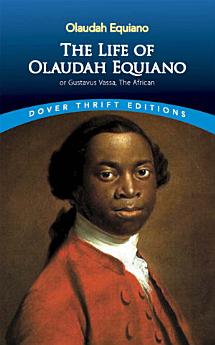The Life of Olaudah Equiano
માર્ચ 2012 · Courier Corporation
4.8star
9 રિવ્યૂreport
ઇ-પુસ્તક
192
પેજ
reportરેટિંગ અને રિવ્યૂ ચકાસેલા નથી વધુ જાણો
આ ઇ-પુસ્તક વિશે
Slave narratives are powerful indictments of the horrors of slavery and oppression, invaluable not only for the stories they tell but also for the consistently high quality of their literary style. This book by Olaudah Equiano is one such story. A compelling account that has gripped and fascinated readers since its original London publication in 1789, the narrative describes Equiano's formidable journey from captivity to freedom and literacy.
Charting a passage that takes him from life as an Igbo prince in what is now eastern Nigeria to the New World, Equiano begins with a description of his native land that includes particulars of the dress, agriculture, industry, commerce, rituals, superstitions, and religious ceremonies of his country. In stark and poignant detail he gives a compelling account of his kidnapping and his ordeal aboard the slave ship, his service in the French and Indian wars, as well as many other of his vicissitudes and adventures until he finally settles in England, where he becomes a key figure in the British abolitionist movement.
Skillfully written with a wealth of grossing detail, this volume powerfully illustrates the nature of the black experience in slavery, making it essential reading for students of African-American history and anyone interested in the struggle for equal rights and human dignity.
Charting a passage that takes him from life as an Igbo prince in what is now eastern Nigeria to the New World, Equiano begins with a description of his native land that includes particulars of the dress, agriculture, industry, commerce, rituals, superstitions, and religious ceremonies of his country. In stark and poignant detail he gives a compelling account of his kidnapping and his ordeal aboard the slave ship, his service in the French and Indian wars, as well as many other of his vicissitudes and adventures until he finally settles in England, where he becomes a key figure in the British abolitionist movement.
Skillfully written with a wealth of grossing detail, this volume powerfully illustrates the nature of the black experience in slavery, making it essential reading for students of African-American history and anyone interested in the struggle for equal rights and human dignity.
રેટિંગ અને રિવ્યૂ
4.8
9 રિવ્યૂ
લેખક વિશે
One of the most remarkable figures in the history of African literature is Olaudah Equiano, who is also known as Gustavus Vassa. He was born into an Igbo community that he called Essaka, or most probably Isieke, in what is now the Ihiala local government area of the Anambra State of Nigeria. Captured and sold into slavery at the age of 12, he was taken to the West Indies. There he was resold to a British naval officer who helped him acquire an education and some nautical experience. When Equiano was beginning to consider himself a free man, he was unexpectedly sold again to a Philadelphia trader, for whom he undertook business trips to the West Indies. These trips enabled Equiano to make enough money to buy his freedom. As a free man, Equiano continued his vocation as a sailor and traveled extensively in Europe, Africa, and the Americas. He eventually joined the abolitionist movement in Great Britain, where he settled down as a respectable African European, married an English woman, and had two children. Equiano moved in high social circles, wrote and spoke frequently in various public media on abolition issues, and petitioned the British Parliament on the evils of slavery. But by far his most important contribution to the abolition movement was his autobiography, The Interesting Narrative of the Life of Olaudah Equiano or Gustavus Vassa, the African, Written by Himself, which was first published in London in 1789. Not only was The Interesting Narrative an eloquent diatribe against the evils of slavery; its early chapters presented a thoroughly idyllic picture of the culture, social life, and geographical environment of his Igbo home, which he describes as "a charming, fruitful vale." In the autobiography, Equiano refutes the detractions of African peoples in European and oriental literatures, religious dogmas, and philosophical and ethnographic writings. He emerges as the first spokesperson of pan-African nationalism, black consciousness, negritude, and a whole range of other contemporary African and African American intellectual movements. The Narrative is a mixture of factual ethnographic and historical details, debatable assertions, and outright fallacies; it is as mystifying as it is revealing. So powerful is its eighteenth-century rhetorical style that, despite the assertion in its title that it was "written by himself," few of his white contemporaries were convinced that such elegant prose and humane sentiments could be written by an African.
આ ઇ-પુસ્તકને રેટિંગ આપો
તમે શું વિચારો છો અમને જણાવો.
માહિતી વાંચવી
સ્માર્ટફોન અને ટૅબ્લેટ
Android અને iPad/iPhone માટે Google Play Books ઍપ ઇન્સ્ટૉલ કરો. તે તમારા એકાઉન્ટ સાથે ઑટોમૅટિક રીતે સિંક થાય છે અને તમને જ્યાં પણ હો ત્યાં તમને ઑનલાઇન અથવા ઑફલાઇન વાંચવાની મંજૂરી આપે છે.
લૅપટૉપ અને કમ્પ્યુટર
Google Play પર ખરીદેલ ઑડિઓબુકને તમે તમારા કમ્પ્યુટરના વેબ બ્રાઉઝરનો ઉપયોગ કરીને સાંભળી શકો છો.
eReaders અને અન્ય ડિવાઇસ
Kobo ઇ-રીડર જેવા ઇ-ઇંક ડિવાઇસ પર વાંચવા માટે, તમારે ફાઇલને ડાઉનલોડ કરીને તમારા ડિવાઇસ પર ટ્રાન્સફર કરવાની જરૂર પડશે. સપોર્ટેડ ઇ-રીડર પર ફાઇલો ટ્રાન્સ્ફર કરવા માટે સહાયતા કેન્દ્રની વિગતવાર સૂચનાઓ અનુસરો.








